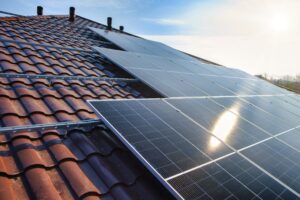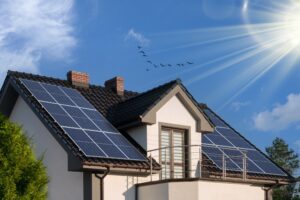Solar energy is a rapidly growing industry, and the benefits of installing solar panels are now widely accepted. As a consequence of rising energy prices, many people are interested in installing solar panels on their properties in order to save money.
Most people do not need to apply for planning permission in order to install solar panels due to permitted development rights. However exceptions apply, so it is important to understand the regulations around planning permission for solar panels in the UK.
In this article, we will discuss whether planning permission is needed for solar panel installations and the installation of solar panels on both residential and commercial properties.
Solar Panels For Residential Properties
The majority of residential properties in the UK can have solar panels installed without the need for planning permission. This is because the UK Government has introduced legislation that allows for the installation of solar panels on roofs without planning permission as they are considered permitted development.
The conditions to install solar panels on residential properties are as follows:
- The solar panels must not protrude more than 200mm from the plane of the roof (excluding any chimney).
- The solar panels must not be installed on a listed building or within a conservation area.
- The solar panels must not exceed the highest part of the roof (excluding any chimney) or the height of the existing building.
- Roof mounted panels must not be installed on a flat roof which forms the principal elevation of the property and fronts a highway.
- The solar panels must not cover an area of more than 50% of the total area of the roof (excluding any chimney). They should be mounted parallel.
- The solar panels must be positioned as close as practicable to the plane of the roof.
- Create a Tailored Quote Based On Your Circumstances
- Takes Less Than 2 Minutes
- Fixed-Online Quotes

Solar Panels On Flat Roofs
Planning permission will usually be required if you want to install solar panels on flat roofs. This is because solar PV placed in this location will usually have to be placed in frames to get the correct angle with the sun to generate efficiently.
The angle means that the panels will protrude above the roof slope more than the accepted 0.2 metres limit which goes against permitted developments guidelines. With flat roofs, you’ll also have to consider normal building regulations and whether the roof is able to accommodate the additional weight.
Solar Panels on Listed Buildings
It is important to note that if you live in a listed building, you will require listed building consent to install solar panels. This is because listed buildings are subject to strict planning regulations to protect their historic and architectural importance. The same applies with anything designated a scheduled monument.
Solar panels in Conservation Areas
Similarly, if you live in a conservation area, you may also require planning permission. Conservation areas are special areas in the UK that have been identified as having unique architectural or historic value.
Every local authority in England has at least one conservation and there are more than 10,000 in the country. Some examples of conservation areas in England where planning permission may be needed for solar panels include the city centres of Bath, Oxford, York and Cambridge which are all known for their historic architecture and are popular tourist destinations. Conservation areas can also be rural areas that are considered to have a special character worth preserving.
If you live in a conservation area and are considering moving to solar energy, it’s advisable to contact your local planning authority for advice. They will be able to make a decision if the addition of solar panels will still maintain the aesthetic feel of the area and would be likely to be approved. This can be more difficult if the position of the solar equipment being fitted will face a road.
Solar Panels For Commercial Properties
If you are considering installing a solar panel system on the roof surface a commercial property, you may require planning permission as commercial properties are subject to different planning regulations than residential properties.
The regulations for installing solar systems on commercial properties are:
- The solar panels must not project more than 1 metre from the surface of the wall or roof on which they are installed.
- The solar panels must not be installed on a listed building or within a conservation area.
- The solar panels must not be installed on a flat roof which forms the principal elevation of the property and fronts a highway.
- The solar PV panels must not cause a material alteration to the external appearance of the building.
It is important to note that planning permission may be required for the installation of solar panels on some commercial properties, and it is advisable to consult with your local planning authority before installation.
Installing solar PV panels
Most residential properties in the UK can have solar panels installed without the need for planning permission as they are usually considered permitted development. However, if you live in a listed building, Conservation Area or even a World Heritage site, you may need planning permission.
Similarly, commercial properties are subject to different permitted development conditions and may require planning permission for the installation of solar panels.
Summary
In 99% of cases, solar panel planning permission is not required, however it is important that you do your own research into the specific permissions which may or may not be required for your individual property.
By following these guidelines, you can install a solar PV system on your property and take advantage of reduced energy bills and all the other benefits of renewable energy.
How to apply for planning permission for solar panels
In most cases, you don’t need planning permission for solar panels, however if you are one of the rare cases where you do, it’s important to understand the process for applying. Here is a step-by-step guide to help you understand the planning consent process:
Contact your local planning authority
The first step in applying for planning permission is to contact your local planning authority. You can find the contact details for your local authority on the Planning Portal website. They will be able to provide you with advice on whether planning permission is required for your solar panel installation and guide you through the application process.
Gather necessary information
Once you have determined that planning permission is required, you will need to gather information about your proposed solar PV panel installation. This may include the size and location of the solar panels mounted, any impact they may have on the surrounding environment, and any safety measures that will be put in place. Structural safety and electrical safety is always paramount.
Submit your planning application
The next step is to submit your planning application. You can do this online via the Planning Portal website, or by submitting a paper application to your local planning authority. Your application will need to include detailed solar installation plans and drawings of your proposed solar panel setup, as well as any supporting documents or reports required by your local planning authority.
Wait for a decision
After you have submitted your planning application, your local authority will review your proposal and make a decision. This usually takes up to eight weeks, although more complex applications can take longer. During this time, your local planning authority may consult with other stakeholders, such as neighbouring property owners or environmental agencies, to gather feedback on your proposal.
Receive a planning decision
Once a decision has been made, you will receive a written notification from the local planning office. If your application is approved, you can go ahead with the installation of your solar panels. In instances when plans for solar installations are rejected, you have the right to appeal the decision.
It’s important to note that the planning considerations for commercial properties can be more complex than for domestic premises. If you are unsure about any aspect of the process, our expert team are ready to help.
- Create a Tailored Quote Based On Your Circumstances
- Takes Less Than 2 Minutes
- Fixed-Online Quotes




